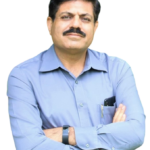
Dr. Seth’s research endeavor after returning to India from National Institutes of Health, Bethesda, USA, has been originality of thinking, taking up challenges of direct relevance to national health problems – of neurodegeneration, particularly HIV-1, drug abuse, Zika virus mediated neuropathogenesis, and very recently effect of SARS-CoV2 on human brain.
For understanding of disease pathogenesis, he developed and perfected a human neural stem cell platform of primary cells of brain. Today his research laboratory is among the very few laboratories in the world that has developed and validated a well characterized model of primary cultures of human neural stem cells to understand brain disorders. This is a unique research resource for neuroscience community in India that has placed Indian scientists at par with peers in the world. These models developed by Dr. Seth are being used to understand molecular mechanisms of neurological deficits in HIV-1/AIDS patients, Parkinson’s disease, Alzheimer’s diseases and microcephaly in babies born due to Zika virus infections of mothers. These have been made available to various institutions such as IITs, IISc, AIIMS, JNU, NBRC, IGIB, BHU.
Dr. Seth was first to demonstrate that severity of HIV-1 dementia is associated with presence of dicysteine motif (C30C31) in HIV-1 Tat protein of HIV-1 subtype B. He showed that HIV-1 Tat subtype C (prevalent in India) lacks this dicysteine motif and is less neurotoxic to human neurons (Annals of Neurology 2008). Dr. Seth demonstrated HIV-1 Tat negatively impacts the properties of human neural stem cells (hNSCs) by affecting cell cycle regulator-cyclin D1 and expression profiles of genes important for proliferation and differentiation (J Neurovirology 2010). Later he discovered the role of TRIM32, a stem cell fate determinant, in HIV-1 induced alteration of hNSCs proliferation and that TRIM32 is regulated by miR-155. He also established the role of miR-320a-VDAC1 axis in astrocyte-mediated neuronal damage in neuroAIDS. These findings were validated in human postmortem brain of AIDS patients from NIMHANS brain bank (Cell Death Differentiation 2016; GLIA 2017). Further, Dr. Seth demonstrated Zika virus induces microcephaly in infants by altering miRNA circuitry and pinpointed role of two miRNAs (Cell Death Differentiation 2018). Recently, he started research to understand why COVID19 patients exhibit neurological symptoms as Brain Fog. In fact, Dr. Seth had expressed this possibility in early stages of the global pandemic in April 2020 itself in a comprehensive review published by him, stating that SARS-CoV-2 is more than a respiratory virus (ACS Chem Neurosciences 2020), that is now accepted worldwide, in consonance with his vision and is being widely cited globally. With these capabilities and expertise Dr. Seth’s laboratory is geared up to understand the cellular and molecular mechanisms as to how the SARS-CoV-2 affects the functioning of brain of COVID19 patients. His research has been highlighted twice by NATURE India and by the International Society of Neurovirology – based in USA, electronic and print media, reflecting its impact in the field.
Dr. Seth because of his passion to understand national problems which are neglected by others, he earned a distinct reputation among his peers globally. Despite the fact that India has millions of HIV/AIDS patients, less than half a dozen researchers are engaged in studying molecular mechanism of neurocognitive and motor deficits (NeuroAIDS) in such patients, as it is challenging. Dr. Seth overcome these challenges with diligence, vision and scientific approach. He is among very few researchers working in the area of NeuroAIDS in India and also in the world. He was invited as collaborator by researchers from Johns Hopkins University, National Institute of Health, University of Nebraska and other prestigious institutions globally and within India. His research at NBRC has been extensively funded by NIH RO1, R21, Office of AIDS-NIH, U.S-India Bilateral Collaborative Research Partnerships (CRP) on the Prevention of HIV/AIDS and Co-morbidities, DST, DBT, ICMR.
The National Academy of Sciences India, National Academy of Medical Sciences and Indian Academy of Neurosciences (IAN) have elected him their Fellow. He has been appointed as area expert to number of DBT, ICMR task forces to lend his expertise. He also serves on Editorial boards of numerous international journals in various capacities.
Dr. Seth serves on the Board and Council of several international scientific bodies reflecting his research accomplishments and international visibility in the field. He is currently serving as Board member of International Society of Neuro Virology (ISNV), USA, International Council Member – Society of Neuro Immune Pharmacology (SNIP), USA and as Council member of Asia Pacific Society of Neurochemistry (APSN). He is promoting the cause of neuroscience in developing countries. Within India, he made significant contributions for promotion of neuroscience with his active role as General Secretary of IAN.
